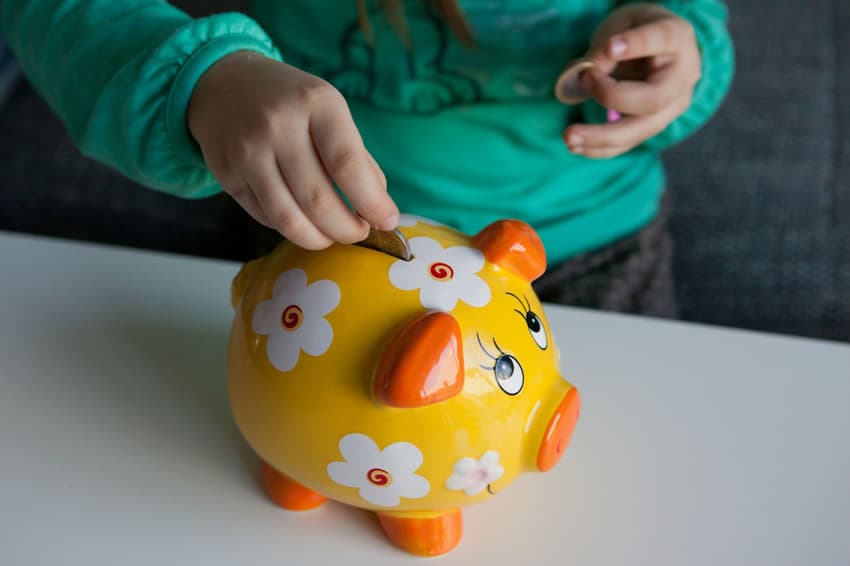German word of the day: Das Sparschwein

Germans are known for being big savers and for loving to pay with cash, so it’s no surprise that many make good use of today’s word of the day.
What does it mean?
Das Sparschwein is the “piggy bank,” coming from the verb sparen, which means “to save, put aside, or spare,” and Das Schwein, or “the pig.”
Die Spardose is another word for piggy bank and can also refer to money boxes more generally.
READ ALSO: German word of the day: Schweineteuer
 A hot air balloon shaped like a piggy bank with the logo of Berliner Sparkasse, one of the largest savings banks in Germany. Photo: DPA.
A hot air balloon shaped like a piggy bank with the logo of Berliner Sparkasse, one of the largest savings banks in Germany. Photo: DPA.
A 2016 report by German magazine Börse am Sonntag said that 45 percent of Germans store money at home. The same report indicated that 57 percent of all Germans have a piggy bank in their household. In Saxony, that number goes up to 69 percent.
Individuals cite different reasons for storing money at home - security, ease of access, fear of a banking crisis.
Where did it come from?
The concept of storing money in jars has been around for centuries. Some theories suggest that the phrase evolved from the word “pygg,” the name of the orange colored clay that individuals used to make pots and jars.
Regardless of the origin, much of the popularity of piggy banks in Europe and America came from Germany, where pigs are considered symbols of luck.
READ ALSO: The complete guide to German animal themed phrases
Germans are also known for their commitment to saving. An entire exhibition was dedicated to the history of this concept at the German Historical Museum in Berlin in 2018.
How is it used?
The phrase Das Sparschwein schlachten (müssen), translated to “to (have to) break the piggy bank,” is a useful one to know.
Here are some other useful phrases with Schwein:
To have good luck in German is to have “schwein gehabt,” or “got pig.”
Instead of saying lucky duck, Germans say “glücksschwein,” or “lucky pig.”
Example Sentences:
Er will eine Münze in das Sparschwein werfen.
He wants to throw a coin in the piggy bank.
Sie muss das Sparschwein schlachten.
She must break the piggy bank.
Comments
See Also
What does it mean?
Das Sparschwein is the “piggy bank,” coming from the verb sparen, which means “to save, put aside, or spare,” and Das Schwein, or “the pig.”
Die Spardose is another word for piggy bank and can also refer to money boxes more generally.
READ ALSO: German word of the day: Schweineteuer
 A hot air balloon shaped like a piggy bank with the logo of Berliner Sparkasse, one of the largest savings banks in Germany. Photo: DPA.
A hot air balloon shaped like a piggy bank with the logo of Berliner Sparkasse, one of the largest savings banks in Germany. Photo: DPA.
A 2016 report by German magazine Börse am Sonntag said that 45 percent of Germans store money at home. The same report indicated that 57 percent of all Germans have a piggy bank in their household. In Saxony, that number goes up to 69 percent.
Individuals cite different reasons for storing money at home - security, ease of access, fear of a banking crisis.
Where did it come from?
The concept of storing money in jars has been around for centuries. Some theories suggest that the phrase evolved from the word “pygg,” the name of the orange colored clay that individuals used to make pots and jars.
Regardless of the origin, much of the popularity of piggy banks in Europe and America came from Germany, where pigs are considered symbols of luck.
READ ALSO: The complete guide to German animal themed phrases
Germans are also known for their commitment to saving. An entire exhibition was dedicated to the history of this concept at the German Historical Museum in Berlin in 2018.
How is it used?
The phrase Das Sparschwein schlachten (müssen), translated to “to (have to) break the piggy bank,” is a useful one to know.
Here are some other useful phrases with Schwein:
To have good luck in German is to have “schwein gehabt,” or “got pig.”
Instead of saying lucky duck, Germans say “glücksschwein,” or “lucky pig.”
Example Sentences:
Er will eine Münze in das Sparschwein werfen.
He wants to throw a coin in the piggy bank.
Sie muss das Sparschwein schlachten.
She must break the piggy bank.
Join the conversation in our comments section below. Share your own views and experience and if you have a question or suggestion for our journalists then email us at [email protected].
Please keep comments civil, constructive and on topic – and make sure to read our terms of use before getting involved.
Please log in here to leave a comment.